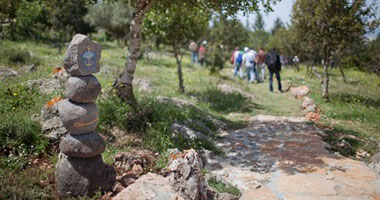 CAPERNAUM, Israel — A new trail across northern Israel offers travelers the chance to walk — or trot — through New Testament sites in the footsteps of Jesus.
CAPERNAUM, Israel — A new trail across northern Israel offers travelers the chance to walk — or trot — through New Testament sites in the footsteps of Jesus.
The newly opened Gospel Trail winds for 39 miles(62.7 kilometers), heading south from Nazareth, across gentle green hills, through Jewish and Arab towns and down to Capernaum, the fishing town where Jesus is said to have established his home base. The Tourism Ministry believes the new trail may attract up to 200,000 Christian pilgrims to northern Israel over the coming year.
Christians are a rapidly growing segment of Israeli tourism, comprising about two-thirds of the 3.45 million people who visited in 2010.
On the Gospel Trail, tourists can ride toward the Sea of Galilee on horseback, accompanied by escorts from a nearby ranch wearing jeans, big belt buckles and embroidered cowboy boots with spurs. The scene feels more Texas than Gospel, especially because according to the New Testament, Jesus' mount of choice was a donkey. Horses were considered vehicles of war.
But as the horses canter to Capernaum, past the occasional grazing cow in a grassy pasture, with the sun setting over the distant hills of the Golan Heights, visitors can imagine for a moment that they have returned to the Holy Land of two millennia past.
The Gospel Trail, planned and researched for more than a decade, cost about $800,000. The government paid for two-thirds of it, the Jewish National Fund the rest. Tourism Minister Stas Misezhnikov said the trail is one element of a branding strategy to sell Israel's abundant religious sites to visitors.
Despite the large numbers of Christian tourists, for years little comprehensive information was available to those hoping to hike alone through the Galilee. Walking trails were marked but maps were in Hebrew, Israel's national language.
This began to change when two entrepreneurs developed a path they called the "Jesus Trail" in 2008, following a slightly different route from Nazareth to Capernaum. Founders David Landis and Maoz Inon offer guided hiking tours and a colorful tour book for the region, the best resource available for trekking in the steps of Jesus. Inon also founded a backpacking hostel in Nazareth.
The new Gospel Trail, by contrast, is a government project. It heads south out of Nazareth, beginning at Mount Precipice, where a mob nearly threw Jesus off a cliff after a sermon he made in a local synagogue. The summit provides sweeping views across the Galilee, from ancient Nazareth and down through the Jezreel Valley, today considered Israel's agricultural heartland. From there, the path goes to Mount Tabor, said to be the site of the Transfiguration, when Jesus spoke to Moses and Elijah and became radiant, and God called him his son. Today, priests celebrate Mass in a Franciscan church with soaring ceilings and pristine white marble floors.
From there, the trail winds north, passing, in springtime, through a carpet of anemones and cyclamens. A side path, also marked, heads to Kfar Kana, where Jesus is said to have turned water into wine. Then the Gospel Trail passes double extinct volcanoes known as the Horns of Hattin — famous as the site where Saladin's Muslim army defeated the Crusaders in 1187. Today a lone mosque stands as one of the few remainders of an abandoned Arab village on the site.
Nearby is the town of Migdal, named for the ancient town of Magdala, said to be home to Mary Magdalene. Farther north, at Tabgha, the Church of the Multiplication of Loaves and Fishes commemorates when Jesus fed a multitude with only a handful of food. And finally, travelers pass by the Mount of Beatitudes before heading to Capernaum, where a charming pink-domed white church gives a European look to the lush green surroundings.
The Gospel Trail includes suggestions to take a boat across the Sea of Galilee, where Jesus is said to have walked on water. The boats run between Capernaum and Kibbutz Ginosar, where marine archaeologists found and preserved a 2,000-year-old ancient fishing boat. Another boat route runs to Tiberias, a town dating back to 20 A.D.
All along the way, gas stations, quiet farming towns and luxurious guest houses offer places to recharge. The trail wends through picturesque Biblical landscapes and long stretches of neatly planted vegetables. It also runs alongside less attractive water distillation plants and rock quarries. Ministry spokespeople say they hope the trail will provide an incentive to entrepreneurs to open hotels and restaurants along the way.
A variety of options already exist for travelers, from the Fauzi Azar Inn tucked into Nazareth's Old City, to the luxurious Scots Hotel in Tiberias. There are also country cottages outside Jewish towns, simple beds on farms and homestays in Arab villages. Camping is also easy in the many parks along the trail.
Jose Leonardo, a chemical supervisor from Houston, walked the trail at Tel Kinrot, a hill filled with archaeological finds that looks over the Sea of Galilee. He hiked with a group of Christian pilgrims visiting Nazareth for the day as part of a week-long trip to Israel. Leonardo said he was especially moved by a visit to Mount Tabor.
"It's great to walk where Christ actually walked and just to know that so much history is here," Leonardo said. "I think every Christian should come out here and actually experience that walk to get closer to God and know his land and his people."



